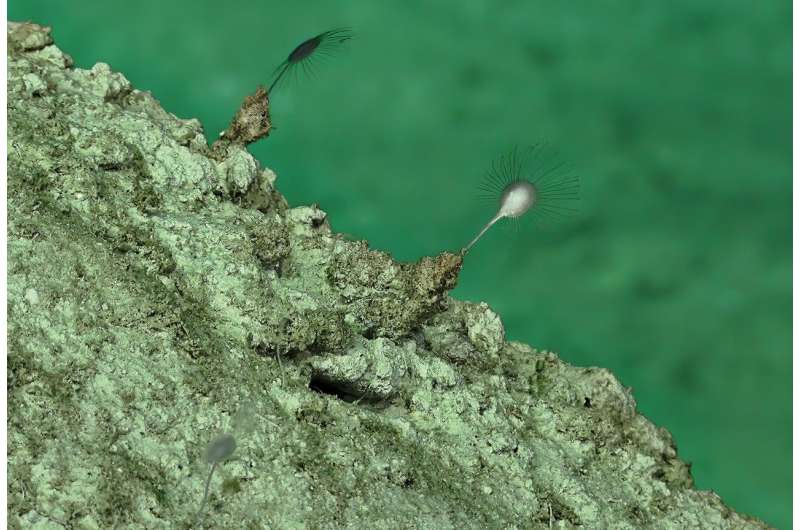This article has been reviewed according to Science X's editorial process and policies. Editors have highlighted the following attributes while ensuring the content's credibility:
fact-checked
peer-reviewed publication
proofread
Deep sea dive from a desk uncovers three new species

Queensland Museum Network Sessile Marine Invertebrate Researcher, Dr. Merrick Ekins has described three new species of carnivorous sponges collected two kilometers below the surface on the Great Barrier Reef. The study is published in the journal Zootaxa.
"It was surreal to be sitting at my desk at the museum during 2020 and directing remote operated vehicle pilots to collect specimens, which appeared to be new species," Dr. Ekins said.
The sponges were collected as part of the Schmidt Ocean Institute's research vessel Falkor in September 2020, which sent a ROV 1,820 meters below the surface to explore the deep reefs of the Great Barrier Reef.
"The Schmidt Ocean Institute voyage 'Seamounts, Canyons & Reefs of the Coral Sea Cruise' was in 2020 and there was a lot of uncertainty with regards to traveling during the COVID pandemic," Dr. Ekins said. "It was thrilling to still be part of this expedition remotely."
Dr. Ekins scientifically described one of the species Abyssocladia falkor in honor of the research vessel and a second Abyssocladia jeanvaceleti in honor of the scientist who first described carnivorous sponges.
For the third he had a bit of fun and named it Axoniderma wanda in honor of the alien wanderer/wanda that parasitizes the host Melanie Stryder in the movie and novel "The Host" by Stephenie Meyer.
Queensland Museum Network CEO Dr. Jim Thompson said more is known about the surface of Mars than the deep oceans. "There is still much to learn about our deep oceans and being part of global research projects only enhances our knowledge," he said. "The ability for our scientists to be involved in research projects such as this is testament to the depth and breadth of expertise of the Queensland Museum Network team.
"Our collaborative approach to research for the benefit of the scientific community."
The 2020 dives were livestreamed and are available to view here.
More information: Merrick Ekins et al, New carnivorous sponges from the Great Barrier Reef, Queensland, Australia collected by ROV from the RV FALKOR, Zootaxa (2023). DOI: 10.11646/zootaxa.5293.3.2
Journal information: Zootaxa
Provided by Queensland Museum



















